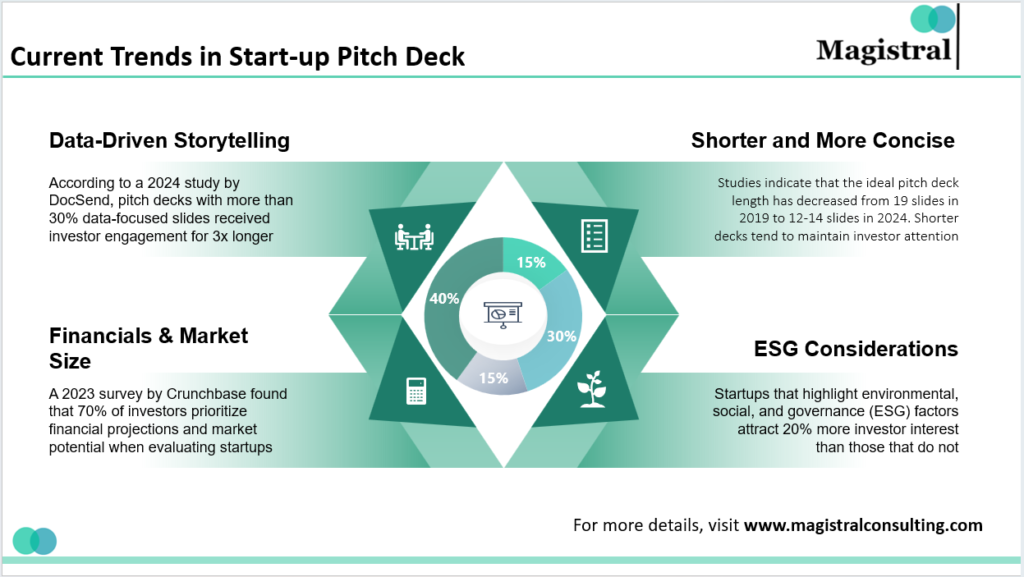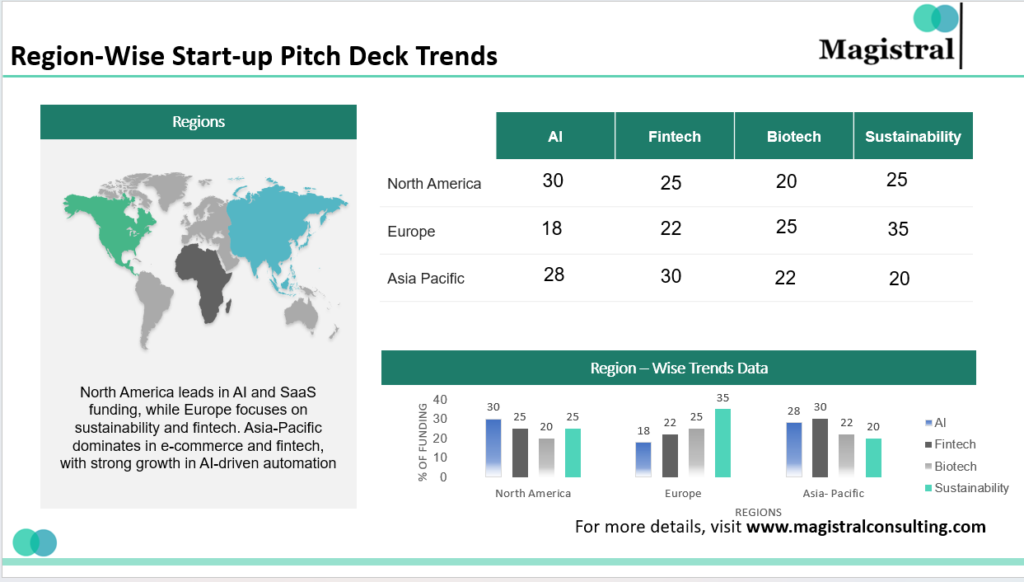An adequately made Startup Pitch Deck remains the perfect tool for funding for startups. Given that more than $445 billion went into startups all over the world in 2023, the competition is very stiff. Investors receive a lot of pitch deck presentations each year, out of which only 1 percent of the startups actually end up getting funded. Therefore, a data-driven and visually attractive pitch deck is crucial for distinguishing yourself.
As per CB Insights, 42% of startups fail due to the lack of market need, while 29% fail due to the inability to raise funds.
This article shows trends, key components, and future opportunities, along with recommended graphs and statistics for better visualization.
The Importance of a Startup Pitch Deck
A pitch deck is a compact presentation that offers investors an overview of the startup, business model, and growth potential.
The investor spends an average of 3 minutes and 44 seconds studying a Startup Pitch Deck.
65% of investors make funding decisions based on the first three slides.
Startups with visually appealing decks are 30% more likely to receive funding.
Trends in Startup Pitch Decks
Some of the trends taking place in Startup Pitch Decks are as follows:

Current Trends in Startup Pitch Deck
Data-Driven Storytelling
Investors fully rely on quantitative data. A report shows that pitch decks with 30% or more data-related slides attracted investor engagement 3 times longer than PowerPoint decks with less than the mentioned percentage of data elements.
Shorter and More Concise Startup Pitch Deck
Research indicates that the optimum pitch-deck length has declined from 19 slides in 2019 to 12 to 14 slides in 2024. Shorter decks will maintain an investor’s attention and keep the message sharp.
Financials and Market Size
According to a survey conducted in 2023, funding expectations and market potential attract the most attention from 70% of investors when evaluating startups.
Financials (24% of total viewing time)
Market Opportunity (21%)
Traction and Growth (18%)
Sustainability and ESG Considerations
Startups engaged in environmental, social, and governance issues attract 20% more investor interest than firms ignoring these agendas. Sustainable business models are indeed the new sweet for every VC and impact investor.
Region-Wise Startup Pitch Deck Trends
There are various trends shaping the landscape in the Pitch Deck arena. The regional composition of the emerging trends is as follows:

Region-wise Startup Pitch Deck Trends
North America
60% of investments target AI and SaaS startups.
Much attention from investors tends to be on early funding rounds.
Seed-stage startups secured an average of $2.5 million in 2023.
Europe
45% of funding for startups is directed toward sustainability.
Focus on green technology and fintech.
With a 30% growth rate in 2023, investments are seen in government grants and venture capital.
Asia-Pacific
The sectors containing e-commerce and fintech account for 55% of total investment into startups.
China and India are the leaders in startup funding, having invested more than $80 billion in 2023.
Startups focused on logistics and AI-enabled automation have seen a 40% year-on-year growth.
Essential Components of a Successful Startup Pitch Deck
Statement of the Problem
Indicate precisely what problem is being solved by your startup.
Example: “95% of online shoppers abandon their carts due to lack of real-time support.”
Solution
The idea should show a fresh, creative way of thinking.
A visual showing the state before and after must be provided to reveal the change.
Market Opportunity
The ability to grow is very appealing to anyone looking to invest.
Example: It is expected that the worldwide market for AI will grow to $1.5 trillion by 2030.
Business Model
How to earn money?
For example, subscription, freemium, B2B SaaS, etc.
Data: Subscription-based startups grow 5x faster than straight-sell companies.
Traction & Milestones
Investors prefer startups with proven traction.
Example: We achieved $1 million ARR in 12 months.
The user base grew 300% in 6 months.
Competitive Analysis
Compare your startup with competitors using a SWOT analysis.
Use a comparison matrix to highlight advantages.
Financial Projections
3–5-year revenue forecast.
Break-even analysis.
Example data: Projected revenue of $50M by Year 5. Expected 40% gross margin.
Funding Requirements & Use of Funds
Clearly define how much funding is needed and how it will be used.
Example: Seeking $5 million in funding for product development (40%), marketing (30%), and team expansion (30%).
Team & Advisors
Highlight key team members’ expertise.
Data: 75% of VC-backed startups attribute success to a strong founding team.
Future Opportunities in Startup Pitch Deck
Interactive & AI-Powered Startup Pitch Deck
65% of investors prefer decks with interactive elements.
AI-powered analytics can track investor engagement.
Personalized Startup Pitch Deck for Different Investors
80% of successful startups tailor pitch decks to specific investors.
Blockchain & Smart Contracts for Fundraising
Token-based fundraising is expected to grow 400 percent by 2027.
Something that presents a momentous proposal in startup culture is almost a guarantee. With a clean and simple design story backing the investment, a deck could lower the startup’s chance of obtaining funding. Financial projections presented in the deck must strive for accuracy to convince the lonesome angel. Leveraging emerging technologies and trends like AI-driven analytics, sustainability, and blockchain fundraising will provide even greater opportunities in the coming years.
With investors spending less than 4 minutes per deck, crafting a clear, engaging, and data-rich presentation is not just a necessity—it’s a game-changer.
Magistral’s Services for Startup Pitch Deck
Pitch Deck Creation
Offering an irresistible design and strategic format that emphasizes storytelling skill to get your startup some merit by showcasing high-quality data visualization and infographics. Graphics in the pitch deck simplify complex information for your audience to digest and allow investors to gain insights into the most important aspects quickly.
Market Research & Analysis
A well-researched market opportunity strengthens a startup’s investment appeal. Magistral conducts in-depth industry research, competitor analysis, and market sizing, including Total Addressable Market (TAM), Serviceable Available Market (SAM), and Serviceable Obtainable Market (SOM). These insights help startups position themselves effectively and provide investors with a clear understanding of the market potential and competitive landscape.
Financial Modeling & Projections
Investors need a clear picture of a startup’s financial viability, and Magistral helps build robust financial models. Our services pertain to revenue forecasting, cost structure assignment, break-even analysis, and evaluation metrics. By putting in place realistic and data-supported financial projections, startups are also able to establish credibility and support their sustainability in the long run.
Investor Targeting & Strategy
As crucial as a thorough pitch is the identification of the right investors. Magistral helps startups choose potential investors depending on the industry, stage of funding, and investment interests. They also refine messaging to fit the different types of investors so that the startup value proposition resonates with the worthy, increasing the likelihood of getting the funds.
Business Strategy & USP Refinement
Business Strategy & USP Refinement show that this sitting unique startup model and selling proposition stand apart from competition. Thus, assistance comes from Magistral in the business strategy refinement, strengthening value propositions, and optimizing revenue generation streams.
About Magistral Consulting
Magistral Consulting has helped multiple funds and companies in outsourcing operations activities. It has service offerings for Private Equity, Venture Capital, Family Offices, Investment Banks, Asset Managers, Hedge Funds, Financial Consultants, Real Estate, REITs, RE funds, Corporates, and Portfolio companies. Its functional expertise is around Deal origination, Deal Execution, Due Diligence, Financial Modelling, Portfolio Management, and Equity Research
For setting up an appointment with a Magistral representative visit www.magistralconsulting.com/contact
About the Author
The article is authored by the Marketing Department of Magistral Consulting. For any business inquiries, you can reach out to prabhash.choudhary@magistralconsulting.com
What are the most common mistakes startups make in pitch decks?
Common mistakes include overcomplicated slides, excessive text, lack of financial details, and unclear business models. Investors prefer data-driven, visually compelling, and concise presentations.
How can startups make their pitch deck stand out?
Using data-driven storytelling, high-quality visuals, and interactive elements increases engagement. AI-powered pitch decks that track investor interest can provide real-time insights for improvement.
What are the emerging trends in startup fundraising?
Trends include active pitch decks, AI-powered data study, block-chain money raising, and ESG-focused funds. Startups that use factors of sustainability draw 20% more interest from backers, showing the rising value of ESG points.
Do investors prefer certain business models over others?
Subscription-based models, such as B2B SaaS, are preferred by investors because they offer predictable revenue and higher scalability. Research shows that subscription startups grow 5x faster than one-time purchase models.